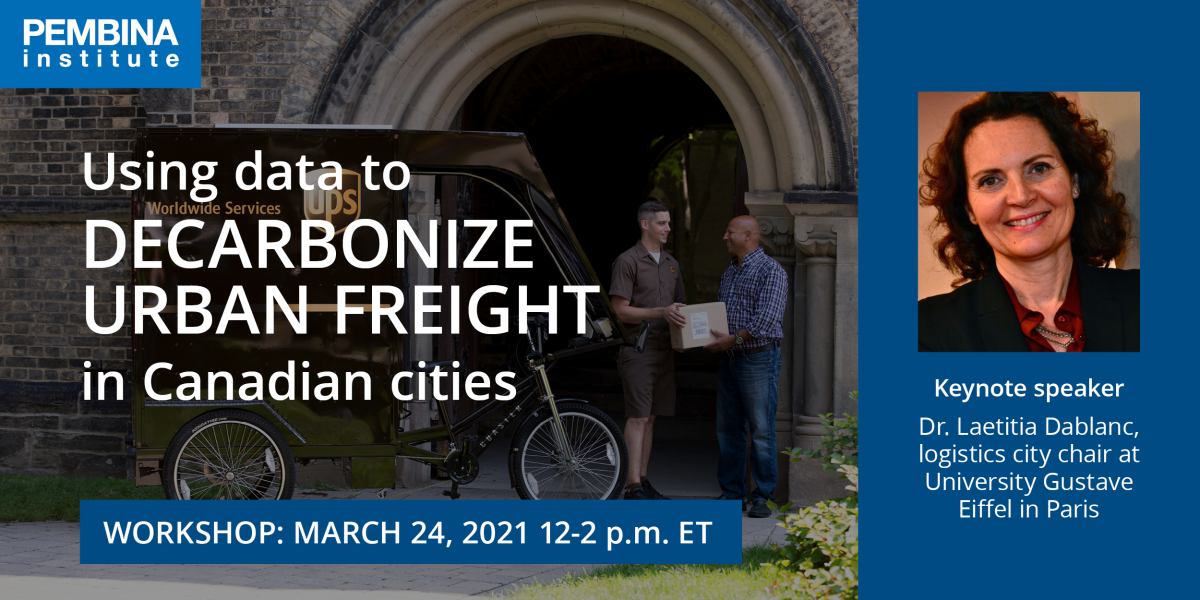Update: The webinar has ended. A report on the topic will be published to this page shortly.
With online shopping on the rise and essential for many, the need for good data collection to help understand freight-related emissions, manage truck activity, congestion, and improve road safety is more urgent than ever. Availability of freight demand and delivery data in Canada is scarce, so where should city-builders begin? What can we learn from data collection efforts in other global cities?
Join the Pembina Institute in a virtual workshop with Transport Canada and Statistics Canada on this increasingly important topic. Hear from keynote speaker, Dr. Laetitia Dablanc, head of the Logistics City initiative and professor at University Gustave Eiffel on Paris’s planning efforts, Lawrence McKeown, chief of analysis and data integration, Centre for Tourism and Transportation Statistics, at Statistics Canada on the economic impacts of e-commerce and implications on urban transport, Mark Stout, senior analyst with the Pembina Institute’s transportation team, and others.
Workshop objectives
- Share findings on urban freight indicators in the e-commerce and home delivery context.
- Learn from other global cities, such as Paris, France, on the challenges and opportunities to better managing urban freight.
- Understand city planners’ data needs by hearing from them directly.
Breakout sessions
- Session 1: Key urban freight data gaps and top priorities in Canadian cities
- Session 2: Potential sources and collection methods of urban freight data
- Session 3: Assessing and evaluating partnerships for local or regional urban freight laboratories
Speakers
 Laetitia Dablanc is an urban planner and professor at the University Gustave Eiffel, where she is the Logistics City Chair. She is an associate professor at the University of Gothenburg, Sweden, a member of MetroFreight, an international network of research on urban freight, and she leads the Young Initiative of the World Conference of Transport Research Society. Her areas of research are freight transportation, freight and the environment, urban freight and logistics, freight policies, and spatial issues related to logistics. Dr. Dablanc’s keynote address, “Decarbonizing urban freight: Needs and potential sources for better data, the case of Paris,” will present carbon assessments made for urban freight in Paris, France. She will discuss the need to improve methods for collecting urban freight data (cheaper, more frequent, reliable, and comprehensive) and will propose directions for improvements and potential sources for better data.
Laetitia Dablanc is an urban planner and professor at the University Gustave Eiffel, where she is the Logistics City Chair. She is an associate professor at the University of Gothenburg, Sweden, a member of MetroFreight, an international network of research on urban freight, and she leads the Young Initiative of the World Conference of Transport Research Society. Her areas of research are freight transportation, freight and the environment, urban freight and logistics, freight policies, and spatial issues related to logistics. Dr. Dablanc’s keynote address, “Decarbonizing urban freight: Needs and potential sources for better data, the case of Paris,” will present carbon assessments made for urban freight in Paris, France. She will discuss the need to improve methods for collecting urban freight data (cheaper, more frequent, reliable, and comprehensive) and will propose directions for improvements and potential sources for better data.
Lawrence McKeown is the chief of analysis and data integration, Centre for Tourism and Transportation Statistics, at Statistics Canada, where he has conducted research on public transit use, airline deregulation, railway performance and logistics as well as internet use and telephone call centres. His presentation will focus on trends in online retail sales, tracking e-commerce at Statistics Canada, collaboration with Transport Canada on understanding the transportation implications of e-commerce urban deliveries, and other interdisciplinary and crosscutting work at the Government of Canada.
Mark Stout is a senior analyst with the Pembina Institute’s transportation and urban solutions team. Mark leads research and policy development in the urban transport sector including pricing curbside access and decarbonizing the urban freight delivery system. His remarks will focus on preliminary urban freight data findings in North America in the e-commerce and home delivery context. Mark will also be facilitating the sharing of experience around data use between workshop participants.
